The Michigan Symphony Band’s historic 1961 tour

William Revelli arrives in the Soviet Union. (Image courtesy of the U-M Bentley Historical Library.)
“Music is the greatest instrument in the world for peace.”
Such were the simple yet profound words of legendary University of Michigan band conductor William D. Revelli as he addressed the audience from the stage of the Moscow Sports Palace on a frigid February night in 1961. It was the acclaimed Michigan Symphony Band’s first of nearly 80 performances on what remains the most ambitious cultural exchange tour ever sponsored by the U.S. government: 30 cities, 10 countries, and three continents, all packed into a grueling three-and-half-month schedule.
At a time when the rapid escalation of the Cold War was causing cold sweats all over the world, almost half of the band’s 25,000-mile trip would be spent behind the Iron Curtain, as the musicians explored Russia and its satellite nations.
It was the most exposure American performers had ever received in the Soviet Union, and the tour would be proclaimed from all sides as an unqualified artistic—and political—triumph.
Tour de force
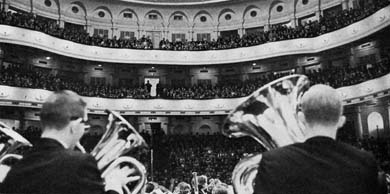
Performing at the Kiev Palace was a genuine highlight of the tour. (Image courtesy of the U-M Bentley Historical Library.)
For each of the “67 boys and 27 girls” who endured a nerve-wracking audition with Dr. Revelli to win a place on the tour, the 15-week journey was an exhausting, exhilarating, and ultimately transformative experience. Galbraith remembers most of the band had never been out of the country before, and some had never set foot on an airplane. “We didn’t know what to expect. But we were excited about it. We loved our band, and we wanted to show it to other people. The fact that they asked us to go was an honor.”The tour began inauspiciously with a series of flight delays that caused the band to miss their first scheduled concert in Moscow. State Department officials worried about the Soviet reaction, but their fears turned out to be wholly unfounded. The young Americans were welcomed warmly by crowds of enthusiastic Russians who packed the performance halls to hear them play, applauding thunderously after nearly every selection and demanding encore after encore.
A nation’s ovation
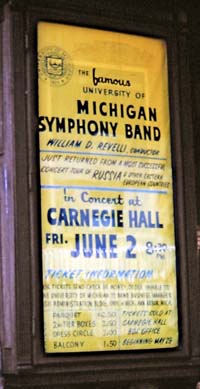
The band capped its tour with a triumphant homecoming concert at Carnegie Hall. (Image courtesy of Martin Gurvey.)
Loren Mayhew, second assistant French horn in ’61, remembers being particularly affected by the unique style of the Russian ovations, in which the audience clapped staccato, in unison. “It’s something you have to experience,” he says. “When you’ve got three or four thousand people all of a sudden clapping in unison with nobody directing them—it’s extremely powerful. That’s pretty much the way it was for the whole tour, that kind of reception.”
The tremendous enthusiasm of the Soviet audiences both astonished and delighted the musicians and their State Department sponsors. “They would greet us with flowers at the train stations,” remembers Galbraith. “At a couple of our shows they broke down the doors because they were pushing so hard to get in.”After many performances the younger concertgoers would surge forward and mob the stage, wanting to speak with the musicians and get their autographs. “We were like rock stars,” marvels Galbraith. “We’d never had that experience before in our lives.”
The band leadership was caught unprepared by the Russian appetite for American music—Broadway show tunes, blues, and jazz—and had to send back to Ann Arbor for additional arrangements. They also were surprised by the appreciative response to the Michigan fight song, “The Victors,” often the biggest hit of the night. The audience was invited to join in, which they did with gusto, singing along with the catchy tune even though they didn’t know the words. This was probably just as well, given the line about “champions of the west.” Galbraith recalls the interpreter would change the lyrics in translation when explaining the song to the audience.
Behind the curtain
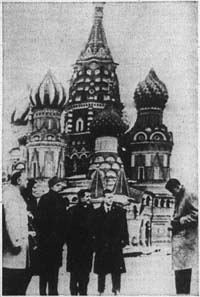
Band members had to comply with a list of approved sites for photography. (Image courtesy of U-M’s Bentley Historical Library.)
Indeed, although relations between the American guests and their Soviet hosts were always friendly and respectful, it was impossible to forget the tensions that existed between the two countries. A few times cameras were confiscated from band members who snapped pictures of people and places that weren’t on the authorized list. The scheduled sightseeing tours also tended to focus on subjects that glorified the U.S.S.R., often at the expense of the United States. In Moscow the band was taken to see the remains of the U-2 spy plane that had carried CIA pilot Francis Gary Powers on his fateful mission over central Russia the previous year.
Later, during their stop in Soviet Armenia, the visitors were surprised to meet dozens of locals speaking American-accented English. They were then horrified to learn their new Armenian friends were American-born U.S. citizens trapped behind the Iron Curtain since the late 1940s, when their passports had been confiscated while visiting relatives. But perhaps the eeriest incident of the tour took place during the band’s visit to Minsk. One night after a show Galbraith found himself in conversation with a man from the audience who spoke remarkably good English. The man explained he was an ex-Marine from Texas but had defected to the Soviet Union and was working at a local radio factory. Galbraith thought the meeting was strange, but nothing more. Two-and-a-half years later, however, following the assassination of President John F. Kennedy, Galbraith saw a photograph of the alleged shooter and realized the man he had met in Minsk was none other than Lee Harvey Oswald. It was not a trick of memory—others in the band who spoke with the man agreed it almost certainly had been Oswald. One member of the group ended up giving testimony about the meeting to the Warren Commission. (Curious coincidence: Oswald’s Russian wife, Marina, later attended the University of Michigan in Ann Arbor.)
Globe trotting
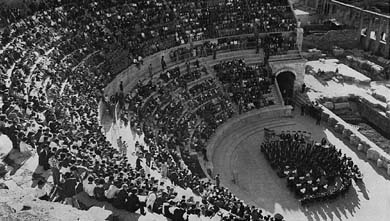
As part of the historic tour, the band played to an appreciative audience in the Roman amphitheatre in Jordan. (Photo courtesy of the U-M Bentley Historical Library.)
The band left the Soviet Union in mid-April and spent the next month-and-a-half traveling the Middle East, playing before appreciative audiences in often exotic locales such as the 2,000-year-old Roman amphitheatre in Jordan. On May 30 they finally boarded a plane for New York and their triumphal tour-closing concert at Carnegie Hall. Then it was back to Ann Arbor to collapse from exhaustion.
As a reward for their efforts they received a resolution of congratulations from the Michigan state legislature, and four hours of course credit from the University. Not to mention, of course, a lifetime’s worth of priceless memories.
Reprise
Since then most of the band has remained in touch. Many returned to Ann Arbor for a 50th reunion in the fall of 2011. “We were bonded over the 15 weeks of the 1961 tour because it was a magnificent ordeal we went through,” explains Galbraith. “Then when we had the 50th reunion, we found out we were even better friends because we all lived fuller lives.”
The reunion went so well that a few band alumni decided to go back to Russia this past spring to revisit and reconnect. Everywhere they went they met people who remembered the original tour. Loren Mayhew got the surprise of his life in a hotel lobby when a man came up to him waving a printed piece of music. He was a retired horn player with the St. Petersburg Philharmonic. The sheet of music was more than 50 years old and had Mayhew’s signature on it.
Do you have a special memory of the band?
“I had given it to him as sort of cultural exchange of my own, along with a couple of other things, like a University of Michigan lapel pin,” explains Mayhew. “He still had it all, and he brought it and showed it to us. It was really wild.”
Those who went back discovered that some things about Russia hadn’t changed. “When they find out you’re American, the young people still want to talk to you the way they did 50 years ago,” Galbraith says.
But other aspects, thankfully, are quite different. The Kremlin, closed to the American visitors in 1961, is now open to tourists, and the formerly grim Red Square is now filled with the laughter of kids playing soccer and basketball.
“It was a terrible time when we first went to Russia,” reflects Galbraith. “There was the Iron Curtain. It was the Cold War. They were going to bury us, and there were missiles in Cuba. That’s all gone. We didn’t have a whole lot to do with it, but I’m convinced we had a little bit to do with it. And that’s something to be proud of.”

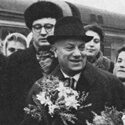

Tony Cecere - 1974BM 1975 MM School of Music
I am thrilled as a member of the 1971 european Tour Band to see this commemoration of the achievments of my colleagues who went to the USSR in 1961. Bravo.
Reply
Bruce Cadwallender
This is a fascinating account. I grew up in the 50’s and 60’s, fearing the Russians as our mortal enemies, and wound up facing off with them as a strategic missile crew commander during the cold war. Now I see things differently, as reflected in this experience, that we are all just people, with music and art as a common bond. By and large, it’s the politics and governments that set us against each other.
Reply
Charles Martyn - 1963 - Rackham School
Memories of excellence, musical, personal, international insights, lifelong friendships,
appreciation of colleagues and opportunities which existed no other way. In speaking for the students many times, as their concertmaster, my comment then as now was “this was an opportunity of a lifetime.” It could never be duplicated in a classroom, lecture or travelogue, the experience was priceless, and in my opinion, our government profited by our ambassadorships as much as we did. It was an honor and a privilege to have been a part of so outstanding and memorable musical experience.
Reply
Richard Longfield - 1957 and 1961
I was a member of the cornet section for this tour, pleased to again read this account and to add my thoughts to those of Charles. Now, 61 years later, memories of the experiences, the honor of representing our University, State and Nation, of performing for audiences in cities most of us never dreamed of visiting, remain amazingly vivid. I think of them often as my friendships continue – even strengthened over time. By now it is quite likely few US citizens know of our State Department’s Cultural Exchange program’s efforts to counter the USSR’s propaganda. I will gladly lend my support to create a comprehensive account of it as soon as possible, before those of us, grateful to have participated and able to assist in the project, are no longer able or alive.
Reply